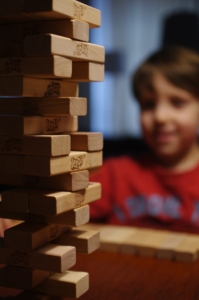By the time parents consider children’s behavioral therapy, they often feel completely overwhelmed. A child’s behavior problems can leave parents pulling their hair out, wondering, “Where did I go wrong?” or “Why is my child like this?” or “Is it possible for anyone to help?”
The constant demands of parenting can create a sense of desperation when things aren’t going well. Parents can become exhausted and burned out, making it harder to manage their child’s behavior. San Diego Christian Counseling can help parents who are feeling overwhelmed by offering support and guidance.
Behavioral therapy helps children who struggle with ADHD, anxiety, depression, or other mental health or behavioral conditions. It can give parents the tools to provide structure, positive reinforcement, and effective discipline, with the goal of each child being able to function well and thrive.
Behavioral Therapy for Kids
Not only can an experienced and trained mental health professional provide therapy and support for your child, but they also work in conjunction with parents and provide support, direction, and encouragement.
 The relief of knowing that you’re providing help for your child can lift a heavy weight off your shoulders. And since behavioral therapy involves parents every step of the way, you’ll also benefit from learning how to help.
The relief of knowing that you’re providing help for your child can lift a heavy weight off your shoulders. And since behavioral therapy involves parents every step of the way, you’ll also benefit from learning how to help.
Behavior therapy is heavily parent-involved. Christian counseling and behavior therapy offers a faith-integrated approach. We often view therapy from a purely secular perspective, but at our office, we believe that God provides mental health treatment, just as he provides physical health treatment, and we seek to be his instruments as we serve each client with compassion.
What is behavioral therapy for kids?
“Behavior therapy refers to a modality of psychotherapy designed to help parents develop effective strategies for managing their child’s behaviors. Behavior therapy also teaches children healthy ways of managing their emotional reactions and behaviors, and how to adjust to disappointments and tolerate frustrations.” (Texas Children’s)
Psychotherapy is another word for talk therapy. It takes a two-pronged approach: working with both parent and child. In this process, parents learn how to consistently implement effective responses and proactive parenting techniques, while children learn how to process emotions and regulate them.
Sometimes when a situation with a child is incredibly difficult, it’s hard to see past the tunnel vision of the moment. Christian counseling behavioral therapy for kids provides an outside perspective and professional help.
While this process takes time, parents often feel a sense of relief early on, as the helplessness of not knowing what to do often causes a great amount of stress. Keep reading to learn more about how behavioral therapy can benefit you and your child, and how Christian counseling and behavioral therapy might be the right fit for you.
Does my child need behavioral therapy?
Wondering if you should take your child to therapy can bring up a mixture of emotions. Self-doubt, grief, anxiety, and shame can be a few of the common reactions to considering behavioral therapy for your child.
A grace-based approach to therapy is the most productive. There is no shame in seeking help. Being a parent doesn’t mean you automatically know the most helpful way to handle every behavior your child displays. By seeking help, you are modeling a skill that can be helpful for your child throughout their life. You are modeling a willingness to ask for help when you need it.
 How do you know if your child’s behavior is serious enough to warrant therapy? Your child doesn’t need a behavioral diagnosis to seek counseling. Sometimes we reach a new stage or phase of parenting where we need help setting new routines and patterns to settle into an approach we’re comfortable with.
How do you know if your child’s behavior is serious enough to warrant therapy? Your child doesn’t need a behavioral diagnosis to seek counseling. Sometimes we reach a new stage or phase of parenting where we need help setting new routines and patterns to settle into an approach we’re comfortable with.
When you call us to schedule your risk-free initial session, you’ll be able to meet with a counselor and discuss your concerns, hear the options for treatment, and consider your path forward.
It’s important to be able to identify behavioral patterns in children that indicate talking to a professional. Here are some of the most common reasons parents seek behavioral therapy for kids:
- Mental or behavioral conditions including ADHD, anxiety, or depression. In conjunction with other forms of therapy (or in some cases, medication), behavioral therapy can help with managing symptoms and creating helpful routines.
- Acting out physically including biting, hitting, etc., especially beyond a normal developmental stage of doing so. Older children may start fights, throw or break things, and show other forms of physical aggression.
- If the child’s behavior interferes with school and relationships.
- A diagnosis of oppositional defiance disorder, an extreme lack of empathy, cruelty to animals, complete non-compliance, etc.
- Older kids or teens who show continual disrespect, struggle with limits, or display signs of early sexual activity.
According to the Child Mind Institute:
“Parents all feel like pulling their hair out at moments, but you should think about getting help when difficult behavior becomes a regular thing, when it’s causing distress in the family, when you’re starting to get depressed, or so stressed that you’re having trouble liking your child.”
It’s important to consult with your child’s doctor and a mental health professional if your child has serious behavioral problems. In some extreme cases, outpatient treatment may not be enough, and in-home therapy or even residential treatment may be required. But rest assured that behavioral therapy is effective for many children and their parents.
How does behavioral therapy work?
Behavioral therapy for kids includes numerous different focuses and modalities. Some parent-focused approaches include parent-child interaction therapy (PCIT), parent management training (PMT), and positive parenting program (Triple P). Talk to your counselor about options and the types of approaches he or she most commonly uses.
In general, behavioral therapy has a lot of parental involvement. It involves setting consistent routines and boundaries, learning how to manage attention-seeking behaviors, and strategies for giving directions and discipline.
Implementing an effective parenting approach takes time and practice. No parent is perfect, and your counselor will work with you to assess your child, employ helpful strategies, and adjust as necessary based on your child’s needs and personality.
Help and Hope for Struggling Parents
One of the hardest parts about parenting a child with behavioral issues is feeling alone and isolated in your struggle. You might compare yourself to other families and think that you’re the only one who’s having this problem. You might struggle with shame and discouragement.
In addition to behavioral therapy, some parents find that individual counseling can help them on a personal level to manage stress, heal from adverse childhood experiences of their own, and take care of themselves so that they’re able to parent from a place of strength instead of exhaustion and turmoil.
He tends his flock like a shepherd: He gathers the lambs in his arms and carries them close to his heart; he gently leads those that have young. – Isaiah 40:11, NIV
 God’s heart for children and their caregivers is evident throughout Scripture. He does not ask us to be perfect parents. Rather, he models unconditional love for us, as he calls us his dearly loved children. (Colossians 3:12, NIV) Only when we experience the love, grace, and patience God has for us, can we fully reflect that to our children.
God’s heart for children and their caregivers is evident throughout Scripture. He does not ask us to be perfect parents. Rather, he models unconditional love for us, as he calls us his dearly loved children. (Colossians 3:12, NIV) Only when we experience the love, grace, and patience God has for us, can we fully reflect that to our children.
If you are feeling weary and discouraged in your parenting journey, the counselors at California Christian Counseling are here for you. We want you to find healing, rest, and hope in Christ. We find great joy in being tools of His provision in practical ways that can help your family find more peace and stability every day.
Contact our office at San Diego Christian Counseling to schedule your initial appointment whenever you’re ready. Feel free to browse the directory of counselors so you can find the one that’s right for you.
Resources:
https://www.healthgrades.com/right-care/childrens-health/signs-your-child-may-need-behavioral-therapy
https://www.verywellfamily.com/when-do-child-behavioral-problems-require-professionals-1094789
https://childmind.org/article/problem-behavior-in-preschoolers-2/
https://www.texaschildrens.org/blog/2017/02/explaining-behavior-therapy-children-and-teens
Photos:
“Pals”, Courtesy of Nathan Dumlao, Unsplash.com, CC0 License; “Tug of War”, Courtesy of Anna Samoylova, Unsplash.com, CC0 License; “Jenga”, Courtesy of Michal Parzuchowski, Unsplash.com, CC0 License


